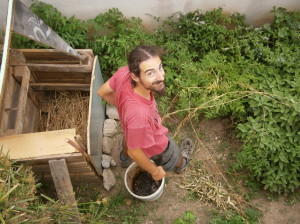Updated on November 23, 2020
1,2… Compost!
Composting is a technic to turn organic wastes into high quality compost thanks to decomposing organisms
Importance of compost at home
– Reduction of the quantity of waste to transport to the garbage dumpster or to the incinerator. – By returning organic material to the ground, its life comes full circle. – Getting high quality compost for our plants without chemical products.
Advantages of compost
– For the ground: it helps create optimal conditions of humidity and ventilation, it is also a natural product without chemicals and free of pathogenic organisms. – For plants: it has a lot of nutrients. – For us: we don’t need to look for it or buy it, we make it by ourselves.
HOW TO MAKE COMPOST? WITH THE COMPOSTER!
There are different types of composter. We did it with wood, but you can also make it with a metal net.
Anyway there are some rules to build any composter:
– A lateral access to the composter for the air to get in is necessary, so there is oxygen. The access must not be very large in order to keep optimal temperature conditions. – We need to put a lid on the top to cover it from the rain and to avoid over-humidity. – Build it without base, so the waste is in direct contact with the ground and the decomposing organisms can get into the composter – It must be easy to open and work with.
WHAT CAN WE THROW IN THE COMPOSTER?
The next table explains it in a simple and essential way, always talking about a normal home kitchen composter. 
There are many particular cases/situations, but in general it’s good to follow these advices.
– All the material must be organic; – The smaller the pieces are, the faster the decomposition will be; – Diversity is always good; we can add old leaves or straw to make the mix more heterogeneous.
WHAT HAPPENS INSIDE THE COMPOSTER?
The process of turning organic waste into compost, caused by the micro-organisms; it’s explain by OXYDATION. That process takes close to 5-6 months and there are two big phases: DECOMPOSITION and MATURATION of the compost. 
There are three key factors to reach an efficient oxidation process:
– the optimal TEMPERATURE changes depending on the phase (15-70ºC). Finding a good place for the composter facilitates the process: the composter must be protected from the sun in summer and from cold as much as possible during winter; – the optimal HUMIDITY level must be between 40-60%. If it is lower than 40 %, the process will become very slow; if it is higher than 60 %, the quantity of oxygen will decrease; – the CROSS-VENTILATION must be over 10% because if we don’t have enough oxygen, the process becomes anaerobic, which leads to the putrefaction of the elements.
We could talk a lot more about compost, but we leave for your curiosity to discover the rest of the details and we encourage you to make your own composter.










